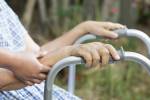Leukemia movies omit final scenes
The Hollywood treatment of a childhood bout with leukemia, one that makes your tears flow in the movie theater or living room, often involves a seriously ill boy or girl whose wise physician uses all the therapies at his command to bring the youngster back to cheerful good health.
As the stirring climax plays out with characters grateful for the significant strides in medical care that made it possible for life to triumph over death, there is no question that filmmakers want you to believe that problems associated with cancer are one less thing that a child and family will have to worry about as the youth journeys into adulthood.
If only it were so.
Cynthia Compson, whose 11-year-old son Steven overcame leukemia first diagnosed at age 3, appreciates a story about a once-threatened family living life happily ever after as much as anyone. But the hairdresser says a movie version of overcoming childhood cancer generally fails to deal with the worrisome reality of coping with the vestiges of a disease treatment that can even play havoc with a child’s brain power.
As she sat in her home near Rancho Drive and Cheyenne Avenue the other day, the 34-year-old wife of a city marshal talked about a side effect of cancer treatments on children that has already cost her thousands of dollars on special tutoring in reading. She said she expects to spend thousands more on special tutoring for math.
“It’s hard for him to concentrate in a class, so I get him individual help,” she said as Steven played on an iPad. “It’s like he has ADHD but this isn’t a chemical imbalance –– this comes from what a drug treatment did to his brain.”
Compson is grateful that Dr. Alexandra Walsh, a pediatric oncologist with Comprehensive Cancer Centers, recently started a survivor clinic for pediatric cancer patients and their families.
Of the 20 families that showed up for the first session of the survivor clinic, Walsh noted that 19 had children with learning difficulties. Often, she said, chemotherapy used to eradicate leukemia goes into the spinal fluid and affects the brain.
“At the survivor clinic we have an education specialist to evaluate the children and to direct parents to help,” she said.
With the survival rate of children five years after treatment now 80 percent, Walsh said the young survivors moving into adulthood, as well as their parents, must be aware that toxic drug and radiation therapies used to kill cancers often place former patients at higher risk for problems such as new cancers; heart, lung, liver and kidney complications; emotional and psychological challenges; and sexual and overall growth development.
“Knowledge is power,” Walsh said, stressing that timely visits with specialists can recognize problems early, so they’re more easily overcome.
Consulting with patients and their families at the survivor clinics are disease specialists and therapists. For all patients, the clinic creates a personal, detailed laminated history of their treatment, which can be given to doctors in the future.
“Too often patients and their families don’t know what treatments were given and it’s difficult for another doctor to treat the patient appropriately in the future,” Walsh said.
Walsh stressed patients need not have been treated by Comprehensive Cancer Centers for them and their families to use the clinic’s free services. The next meeting is at 1 p.m. March 28 at 3196 S. Maryland Parkway, Suite 400. Call 702-688-6180 for further details. The clinic offers services to former cancer patients up to age 21.
Compson prays the survivor clinic brings attention to the educational needs of children who have battled cancer.
“I hope insurance programs will see tutoring as part of the treatment for childhood cancer or that the public schools will see the need to develop a special program,” she said.
While talking about the learning and possible health challenges her son faces because of cancer obviously makes her uneasy, Compson said she’d much rather deal with those problems than the alternative.
“I could be talking to you right now about how I lost my son to cancer,” she said. “I much prefer this.”
Paul Harasim is the medical reporter for the Las Vegas Review-Journal. His column appears Mondays. Harasim can be reached at pharasim@reviewjournal.com or 702-387-2908.























